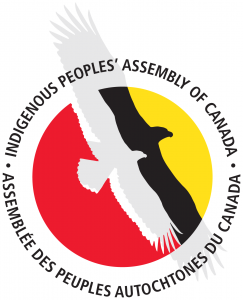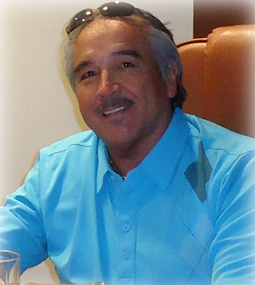T he Indigenous Peoples Assembly of Canada (IPAC) formerly the Congress of Aboriginal Peoples (CAP) was founded in 1971.
he Indigenous Peoples Assembly of Canada (IPAC) formerly the Congress of Aboriginal Peoples (CAP) was founded in 1971.
IPAC works to enhance the individual and collective well-being for off-reserve status and non-status Indians and Métis. It advocates with government agencies, increasing the individual and collective capacity for governance and management and by providing programs and services specifically designed to meet their needs.
For further information on IPAC click Mission
Renewable Energy Project
Trials and tribulations of business development
Chief Hare talks trials and tribulations of business development projects for his community; and
how the Mother Earth Renewable Energy (MERE) project in M’Chigeeng First Nation is producing lucrative results for the Manitoulin Island community.
Chief Joe Hare, (retired)
M’Chigeeng First Nation
DEVELOPING BUSINESS RELATIONSHIPS
David’s current consulting activities include meeting facilitation, team development, cross-cultural understanding between northern First Nations and Métis Settlements and the oil and gas industry.
In this video interview David talks more specifically about facilitating relationships between companies and Aboriginal communities.
David Turner
Partner & Vice-President,
First Peoples Group
Ceremonial Tobacco
For many Indigenous people tobacco has been used traditionally in ceremonies, rituals and prayers for thousands of years. It is used for a variety of medicinal purposes and its ceremonial use has powerful spiritual meaning establishing a direct communication link between the person giving and the spiritual world receiving.
Colby talks about the many challenges his company had in order to bring to market a Canadian manufactured organically grown tobacco for use in ceremonial practice.
Colby Delorme
President
The Imagination Group
Value-Based Leadership Dealing with change management
David talks about how a leader should prepare for change management. He makes the argument that capacity building may start and end with the Corporate Board or with Senior Management, but change needs staff buy-in if strategic development is to happen.
David Abbott
President, CEO
Morning Sky Consulting
SHARE YOUR KNOWLEDGE AND BUILD ON PRACTICAL EXPERIENCES
Gain important development experience and establish important connections with organizations engaged in indigenous development around the world.
Claire talks about how the University of Winnipeg Master’s in Development Practice: Indigenous Development builds the skills required to be a successful practitioner of sustainable development. Indigenous knowledge and experience are at the core of an innovative curriculum that cuts across health, management, natural and social sciences.
Claire Reid
Director
Master’s in Development Practice: Indigenous Development
University of Winnipeg
Cindy Blackstock Challenges Canada PART III – The Need to Talk About Our Kids As Much As We Talk About Natural Resources and Our Businesses
Cindy talks about various pilot projects on child-welfare and their evidence based results. She also makes the argument that we need to put as much energy in talking about our kids as we do on natural resources and our businesses.
Dr. Cindy Blackstock
Executive Director
FN Child and Family Caring Society of Canada.
Cindy Blackstock Challenges Canada PART II – The Need for Equal Services for FN Child and Family
Cindy talks about the current federal funding approach to child and family services.
Because of the lesser budgets provided by the Federal Government, FN Child and Family Services Agencies have not kept pace with the level of Children and Family services provided to non-Aboriginal people by provincial and territorial Agencies.
Dr. Cindy Blackstock
Executive Director
FN Child and Family Caring Society of Canada.
Cindy Blackstock Challenges Canada — “Rid Canada of Racial Discrimination Against Children before it’s 150th Anniversary” — Through time Canadians have relied on Government to be the source of change but government’s don’t create, they respond to change. This is the first of a three part series.
Dr. Cindy Blackstock
Executive Director
FN Child and Family Caring Society of Canada
Access to Equal Opportunities: Need to be bold to make strides. Although there is momentum within the Aboriginal community when it comes to employment, education and economic prosperity more needs to be done at the corporate level to ensure cultural inclusion.
Monique Bateman
Special Advisor on Aboriginal Relations
TD Bank
Transforming education in Northern Communities — the Cisco experience in connecting schools in the North. Enhancing Education in remote Northern communities has become a little easier.
Willa Black
Vice President, Corporate Affairs
Cisco
In a panel Yogendra Chaudhry with Carol Crowe, and Kara Flynn talk about the development of people skills needed to implement community volunteer programs in Aboriginal communities, schools and in non-Aboriginal organizations. As well as working collaboratively with Aboriginal communities.
Yogendra Chaudhry, PhD., VP, Professional Services, ECO Canada
Carol Crowe, Instructor, Parkland College (BEAHR) ECO Canada
Kara Flynn, VP Gov’t & Public Affairs, Syncrude Oil
In this presentation delivered at IPAC’s 2nd Leadership Creative Presentation we learn about ‘Storytelling’ and how it is use to convey traditional teachings, oral history, oratory and in transmitting the interpretation of public and current affairs on Turtle Island
Dr. Mary Lou Smoke and Dr. Dan Smoke
Communicators, Radio hosts and Professors
The symposium starts with Elder Gordon Williams, he sets the tone for this leadership conference and provides the blessing. The conference is hosted by Marie Delorme, in her remarks she talks about the important role hundreds of Aboriginal women played in building Canada.
National Chief Dwight Dorey provides the symposium opening remarks. He reminds us that CAP represent approximately 70% of Aboriginal people, including non-status, southern Inuits , Metis, all people living off reserve. He also reminds the audience of the importance for the future of our youth to build partnership with all peoples, government and the corporate sector.
Creative Leaders’ Symposium 2016
An overview of the 2nd annual Creative Leaders Aboriginal Economic Prosperity Symposium, held in the City of Ottawa, March 2016Introduction by: Chief Dwight Day


Recent Comments